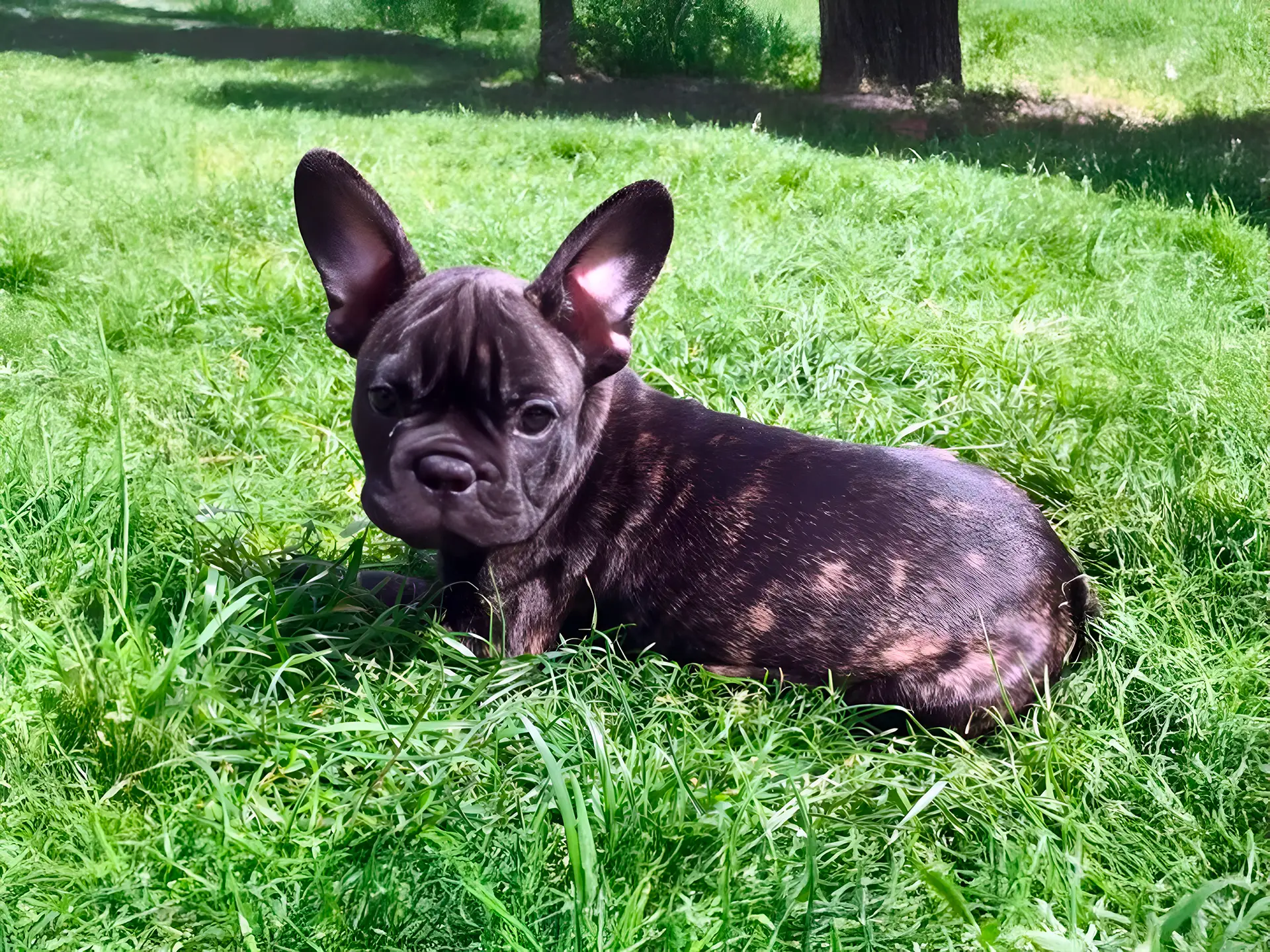French Bulldog Brindle Dog Breed Info & Overview
The French Bulldog Brindle, with its striking brindle coat and iconic bat-like ears, is a small yet sturdy companion full of charm. This breed blends a playful spirit with a relaxed demeanor, making it an excellent choice for city dwellers and families alike. Known for their affectionate nature and quirky personality, French Bulldog Brindles bring endless joy and companionship to any home.
Characteristics
Pictures
Breed History
Did you know the French Bulldog Brindle wasn’t always the pampered pooch we know today? Its origins trace back to 19th-century England, where small Bulldogs were bred by lace workers as their companions. When these artisans relocated to France during the Industrial Revolution, their little canine buddies came along, quickly gaining popularity across French cities.
In France, these Bulldogs were bred with local terriers, resulting in the smaller size, refined features, and those iconic bat ears we adore today. The brindle coat, with its tiger-like stripes, became a sought-after trait, giving the breed a striking and unique appearance. Artists, writers, and Parisian elites soon embraced the French Bulldog as a symbol of sophistication.
By the late 1800s, French Bulldogs had crossed borders and hearts worldwide. Their quirky looks and charming demeanor led to the establishment of breed standards. Today, the French Bulldog Brindle is a delightful mix of history, style, and affection, making it one of the most beloved breeds on the planet.
Temperament, Personality
Charming and mischievous, the French Bulldog Brindle is like the class clown of the dog world—always ready to bring a smile to your face. These affectionate companions thrive on human interaction, often earning their reputation as one of the best lap dogs around.
Their gentle nature makes them fantastic family pets, especially with children. They’re patient and playful, happily joining in on games or snuggling for quiet time. Early socialization ensures they get along well with other pets, transforming them into adaptable, multi-pet household members.
While they might play it cool with strangers at first, they quickly warm up once they sense no threat. French Bulldogs aren’t big barkers, making them excellent for apartment living. However, leave them out of family activities, and you might face their sulking side—these pups despise being left out.
Physical Characteristics
The French Bulldog Brindle is a pint-sized powerhouse with a stocky, muscular build that oozes charm. Their trademark bat-like ears sit perked atop a square-shaped head, giving them an alert and slightly mischievous expression. Dark, expressive eyes complete their irresistibly curious look.
Their short, smooth coat showcases the brindle pattern—a stunning mix of black and brown stripes that often appear tiger-like. This unique coloring adds depth and richness to their appearance. A short tail, often naturally stubby, and a flat muzzle round out their distinctive silhouette.
Despite their small stature, these dogs carry themselves with confidence. Compact but sturdy, they have a low center of gravity, making them surprisingly resilient during play. Their charming swagger and unique appearance ensure they turn heads wherever they go.
Health Issues
The French Bulldog Brindle, like many brachycephalic breeds, can face respiratory challenges due to its flat snout. Hot weather or strenuous activity may worsen breathing issues, so moderation and vigilance are key. Always keep an eye out for labored breathing or overheating.
They’re also prone to hip dysplasia, skin allergies, and eye conditions like cherry eye. Regular vet check-ups can catch these issues early, and a healthy weight helps reduce joint stress. Make sure to clean their facial folds regularly to avoid skin infections.
Another concern is their susceptibility to bloat, a potentially life-threatening condition. Feeding smaller, frequent meals and avoiding vigorous exercise after eating can help reduce the risk. With attentive care, your French Bulldog can enjoy a happy, healthy life.
Grooming Needs
Good news for low-maintenance pet lovers—the French Bulldog Brindle is a breeze to groom! Their short, smooth coat only needs weekly brushing to keep it sleek and shiny. A grooming mitt or soft-bristle brush works wonders to remove loose hairs and keep shedding manageable.
However, their signature facial wrinkles require regular attention. Gently clean these folds with a damp cloth and dry thoroughly to prevent moisture buildup and skin infections. Bathing should only be done as needed, usually every few months, using a gentle dog shampoo.
Don’t overlook ear cleaning, nail trims, and dental care. Their floppy ears can trap debris, and their small jaws can be prone to dental issues, so regular brushing is a must. Keeping up with these simple tasks will ensure your Frenchie looks and feels their best.
Exercise Requirements
The French Bulldog Brindle may not need hours of exercise, but they still enjoy staying active. A daily 30-minute walk paired with some playtime is usually enough to keep them content. They love games like fetch or even short treasure hunts indoors.
Due to their brachycephalic nature, they can overheat easily, especially in hot or humid weather. Exercise them during cooler times of the day and avoid strenuous activities. Their compact bodies make them better suited to bursts of play rather than long-distance runs.
Mental stimulation is just as important as physical activity. Puzzle toys, interactive games, and short training sessions keep their sharp minds engaged. A happy French Bulldog is one who gets to play with their favorite humans daily.
Training Tips
Training a French Bulldog Brindle can be a test of patience, thanks to their stubborn streak, but their eagerness to please makes it worthwhile. Use positive reinforcement—treats, praise, and affection work wonders. Keep training sessions short and fun to hold their attention.
Socialization is vital from a young age. Exposing them to different people, animals, and environments ensures they grow into well-adjusted, confident dogs. Early leash training is also important, as their curious nature might lead them to explore a bit too enthusiastically.
Avoid harsh methods, as French Bulldogs are sensitive and may shut down with negative reinforcement. Instead, focus on consistency and gentle guidance. With the right approach, they’ll be showing off their repertoire of tricks in no time.
Nutrition, Diet
French Bulldog Brindles thrive on a high-quality, nutrient-dense diet tailored to their moderate activity levels. They require about 1 to 1.5 cups of dry kibble per day, split into two meals. Look for formulas rich in animal protein and omega-3 fatty acids to support their muscles and coat.
Avoid overfeeding, as this breed is prone to obesity, which can exacerbate joint and respiratory issues. If they show signs of food allergies—like skin irritation or digestive upset—consult your vet about switching to a limited-ingredient diet.
Fresh water should always be available, especially after playtime. Monitor treat intake, keeping it under 10% of their daily calories. A diet plan customized to their unique needs ensures your Frenchie stays fit and fabulous.
Adoption, Breeders
When searching for a French Bulldog Brindle, prioritize reputable breeders who conduct health screenings for genetic conditions common to the breed. Ask for certifications and meet the puppy’s parents to assess their health and temperament. The French Bulldog Club of America is a great resource.
Adoption is a fantastic option, too! Organizations like French Bulldog Rescue Network often have brindle Frenchies looking for forever homes. Shelters and rescue groups can help match you with a dog that fits your lifestyle.
Steer clear of puppy mills or sketchy online sellers. A little research goes a long way in ensuring you bring home a healthy, happy companion.
Family Pet?
The French Bulldog Brindle is a natural family dog, thriving in homes where love and attention are abundant. They’re fantastic with children, thanks to their gentle and patient nature. Their sturdy build ensures they can handle playtime without being overly fragile.
Their adaptable personality makes them great for multi-pet households, especially when introduced to other animals early. They’re content to curl up on the couch but equally enjoy joining in on family activities.
If you’re seeking a dog that bonds deeply with its human pack, this breed checks all the boxes. Just remember to supervise interactions with very young children to keep playtime safe and enjoyable for everyone.
Right For You?
The French Bulldog Brindle fits perfectly into the lives of those seeking a loyal, affectionate, and low-maintenance companion. Their moderate exercise needs and compact size make them ideal for city dwellers and families alike.
However, they do come with health considerations, so potential owners should be prepared for occasional vet visits. They thrive in environments where they’re not left alone for long periods—they crave human interaction and attention.
If you’re ready to share your life with a devoted sidekick who will keep you smiling daily, the French Bulldog Brindle could be your perfect match.
Conclusion
The French Bulldog Brindle is a delightful blend of charm, affection, and adaptability. Their unique looks and lovable personality make them stand out as exceptional companions. Whether you’re in a bustling city or a cozy suburb, this breed is sure to fill your home with love and laughter. Are you ready to welcome this brindle beauty into your life?
FAQs
-
Why are French Bulldog Brindles less common than other coat patterns?
French Bulldog Brindle coloration is a genetic variation influenced by recessive genes. While not rare, the brindle pattern depends on the specific pairing of parent dogs carrying the gene, making it less common than other standard colors.
-
Do French Bulldog Brindles require unique care for their coats?
French Bulldog Brindle coats are short and sleek, requiring minimal grooming. Weekly brushing helps keep their brindle pattern vibrant by removing loose hair and maintaining a healthy coat sheen.
-
How active are French Bulldog Brindles compared to other French Bulldogs?
French Bulldog Brindles share the same moderate energy levels as others in the breed. Short walks and indoor play are sufficient, but they may show bursts of energy, making interactive toys an excellent option.
-
Are French Bulldog Brindles more prone to allergies?
French Bulldog Brindles, like others in the breed, can have skin sensitivities. Allergies to food, pollen, or grooming products can cause irritation, so using hypoallergenic options and consulting a vet is essential.
-
Do French Bulldog Brindles have a unique temperament?
The brindle coat does not affect temperament, but French Bulldog Brindles are known for their loving, playful nature. Their even temperament and strong bond with family make them excellent companions for all ages.
Breed Ratings
The French Bulldog Brindle is moderately intelligent but may be stubborn during training.
They are playful and enjoy interactive games with their family members.
With moderate energy, they appreciate daily walks and play but aren’t overly active.
Shedding is moderate; regular brushing helps manage loose hair.
They have a low prey drive and usually get along with other small animals.
Grooming is relatively easy due to their short coat and minimal grooming needs.
They can be trained with patience and positive reinforcement techniques.
They prefer company and may experience separation anxiety if left alone too long.
Generally quiet, they don’t bark excessively, making them good neighbors.
Drooling is moderate; it’s noticeable but not excessive.
They are typically friendly with other dogs, especially when socialized early.
Prone to certain health issues; regular vet care is important for their well-being.














